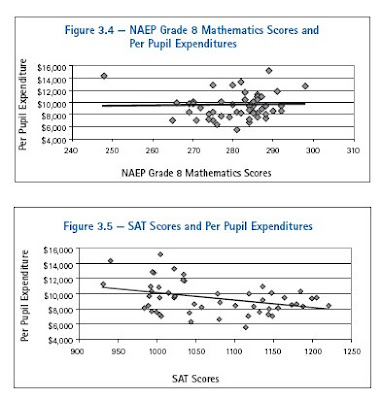 It has often been touted that education is the key to economic development. Perhaps, one caveat should be added: quality education is the key to economic development.
It has often been touted that education is the key to economic development. Perhaps, one caveat should be added: quality education is the key to economic development.
The American Legislative Exchange Council (ALEC) released its 14th edition of the Report Card on American Education: A State-by-State Analysis, which covers the school years 1985-1986 thru 2006-2007. This comprehensive guide ranks the educational performance of the school systems in the states and the District of Columbia with Minnesota placing first and the District of Columbia last. Findings include:
Based on a variety of indicators, ALEC’s 2007 Report Card has found no direct correlation between conventional measures of education inputs, such as expenditures per pupil and teacher salaries, and educational outputs, such as average scores on standardized tests. For instance, class sizes today are 15% smaller than they were 20 years ago, yet of the 10 states that experienced the greatest decreases, only one(Vermont) is found among the highest performing states in the rankings.
Even with dramatic increases in the amount of educational resources spent on primary and secondary education over the past 2 decades–expenditures have risen nationally to an all-time high of $9,295 per pupil–student performance has improved only slightly; 69% of American eighth-graders are still performing below proficiency in math and 71% in reading, according to the 2007 National Assessment of Education Progress.
The latest results of comparison among participating nations of the OECD peg American students’ achievement levels in science below dozens of other countries including Croatia, Latvia, and mainland China. In fact, the United States scores below the combined average of all countries observed.
Comment: Based on data in the report from Table 1.6, real Per Pupil Expenditures for public elementary and secondary schools have increased from $6051 in 1985-86 to $9295 in 2005-2006, a 53.61% increase (see graph above). Over the same period, real inflation-adjusted gas prices rose by only 10.9% according to EIA data, from $2.24 per gallon in January 1986 to $2.484 per gallon in January 2006 (the mid-point in the school year). Even adding two more years of real gas price increases and using the January 2008 price of $3.059, real gas prices have only increased by 36.6% since January 1986, far below the 53.6% increase in real public school spending from 1985-86 to 2005-06.
And the quality of gasoline has stayed the same over the last 20 years, which is not necessarily the case with public schools. In fact, the graphs below show that increases in spending have either no effect on test scores (top graph below, taken from the report) or a negative effect on test scores (bottom chart below).
